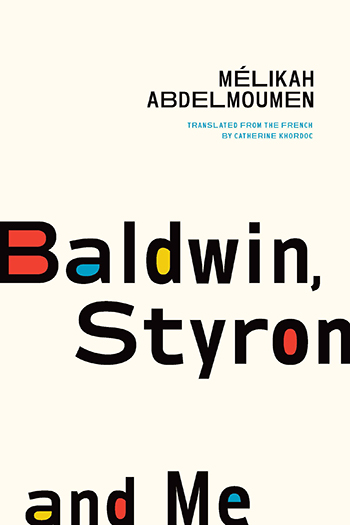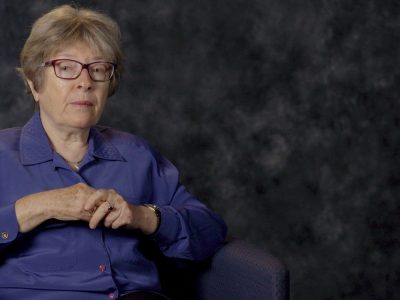Lead image by Oleksii Didok / iStock
By Dan Rubinstein
In The Philosophy of Translation, award-winning translator Damion Searls describes his craft “as something like moving through the world” and argues there’s a “living bond” between translators and the texts they’re immersed in.
This bond and sense of movement — between writers and their readers, between languages and cultures, between past and present — was central to Catherine Khordoc’s process when she completed her first book-length translation, a French-to-English adaptation of a non-fiction work by Quebec author Mélikah Abdelmoumen.

Carleton University Québécois literature scholar and Deputy Provost (Academic Operations and Planning) Catherine Khordoc
Published earlier this year, Baldwin, Styron, and Me is rooted in the unlikely friendship in the early 1960s between acclaimed Black American writer and civil rights activist James Baldwin and white American novelist William Styron, the grandson of slave owners, with the former convincing the latter to write The Confessions of Nat Turner, a controversial, Pulitzer Prize-winning first-person account of an 1831 slave rebellion.
Rooted in Abdelmoumen’s perspective as a racialized woman and exploring questions of race and equity, the book is relevant and resonant more than six decades after the events at its core. And to Khordoc — a Québécois literature scholar at Carleton University currently serving as Deputy Provost — the project reflects not only her love for reading, but also the enduring importance of the humanities with the world at a political inflection point.
“My literary interests have always been at the intersection of culture and language, and translation requires a completely different way of reading,” says Khordoc.
“It’s not just what’s being said but how it’s being said that you need to convey — things such as emotion and sarcasm, all these different layers of meaning.
“The book raises issues around identity and appropriation. One of the values of literature is that it can help us understand experiences that we have not lived. That’s one of the reasons why we need the arts and humanities — so we can put ourselves in other people’s shoes, develop an empathetic response and deepen our understanding of our own lives.”

From Journalism to French Literature
Khordoc grew up speaking French in a multilingual family in Ottawa. Her mother is from France and her father from Egypt with Greek and Arabic ancestry, and both were French teachers.
In high school, she had a part-time job translating community newspaper articles from English to French. She did that to get closer to journalism, which she earned an undergraduate degree in at Carleton, going on to work for CBC Radio in Quebec City before returning to school for a master’s and PhD in French literature.
Although she often ponders how ideas could be expressed in a different language when she reads, Khordoc didn’t think about doing any literary translation until she read Abdelmoumen’s Baldwin, Styron et Me, which came out in 2022. Khordoc sent the author a note saying how much she liked the book and asking whether anybody was translating it into English.

Mélikah Abdelmoumen
“No,” Abdelmoumen replied. “Are you interested?”
Khordoc was excited about the project: the book wasn’t very long, and she “heard its voice in English.”
The women met at a book event in Gatineau in 2023, where Peter Schneider, a program manager at the Canada Council for the Arts (and former high school classmate of Khordoc’s), told them that Dan Wells, the publisher of a literary press called Biblioasis, was interested in Baldwin’s writing, and all of the pieces fell into place.
Baldwin, Styron, and Me has been well received since Biblioasis released it in March. Kirkus Reviews called it “a thoughtful, timely contribution to a controversial debate.” And Khordoc, Abdelmoumen and Schneider will reunite in an on-stage conversation about the book at the Ottawa International Writers Festival on May 16.

Human Creativity Required
While working on this translation, Khordoc was surprised by the degree of creativity required.
Although she doesn’t have any formal training as a translator, she has a lot of experience in “close reading,” which helped her to transfer ephemeral but critical elements of the original work from one language to another.

Baldwin, Styron et Me
Translation is one area in which artificial intelligence (AI) shows promise — and a corresponding displacement of human labour. But while Khordoc sees a role for this tool in translating “technical” material, she’s not convinced of its utility in more literary realms.
“A poem,” she says, “is not just about the words.”
This brings us back to the overarching role of the humanities in modern society, and why debates about issues such as a cultural appropriation are not black or white.
An AI translation would probably not be able to capture the nuances of Abdelmoumen’s thoughts about the relationship between Baldwin and Styron, yet Khordoc can — and this is far from an academic abstraction.
“If all you can talk about is your own lived experience,” she says, “it’s really hard to break down barriers.”
Tuesday, May 13, 2025 in Books, Linguistics
Share: Twitter, Facebook



